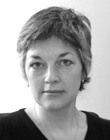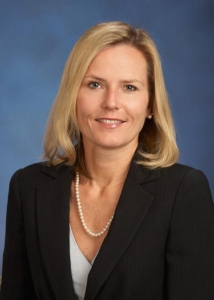 Welcome to M&A Week on The Glass Hammer — we’ll be profiling successful M&A business women all week long!
Welcome to M&A Week on The Glass Hammer — we’ll be profiling successful M&A business women all week long!
By Tina Vasquez, Editor
In the past three months alone, Clare O’Brien has been to London, Paris, Rio de Janeiro (twice), and Abu Dhabi. Traveling around the world isn’t unusual for a leading M&A lawyer with international clients, but the depth, breadth, scale and scope of her work as a partner at global law firm Shearman & Sterling is stunning.
O’Brien’s client list includes such global names as Ardagh S.A., Boston Scientific Corporation, Bunge Limited, Corning Incorporated, Danone, Lafarge S.A., Mubadala Development Company, Quest Diagnostics, and SunGard. She is annually ranked as a leading global M&A lawyer and her crowning achievements include her work on behalf of SunGard in 2005, representing the company in an $11.3 billion private equity-driven acquisition, which garnered her The American Lawyer’s 2005 “Dealmakers of the Year” award, one of the highest honors an M&A lawyer can receive. O’Brien also represented Boston Scientific in its 2006 acquisition of Guidant Corporation.
O’Brien had a rough start in the States that did not foreshadow the success that would come.
“I grew up in Ireland, went to law school at Trinity College in Dublin, and became an attorney at 23,” O’Brien recalls. “I worried that if I stayed in Ireland, I would get stuck there, so I decided to pack up and head to New York in 1985, thinking I’d get a job at a law firm and stay a year or two at the most.”
O’Brien applied to 30 firms for a job – including Shearman & Sterling – and received 30 rejection letters in response. At that time, it was more unusual for non-U.S. trained lawyers to apply for jobs at large New York-based law firms.
“The situation seemed bleak, but then I took and passed the New York Bar exam, which opened up some doors,” O’Brien said.
Making Hard Career Choices
Talent like O’Brien’s never goes unrecognized and before long, she was hired by a small firm based in New York City, the sole woman on a team of six lawyers. When a headhunter approached her with two job offers in 1987, she decided to take the one at Shearman & Sterling. Again, she figured it would be a one- or two-year commitment.
“I sometimes think that my career can be characterized by the absence of forethought,” O’Brien said with a laugh. “I came to New York without a big plan and here I am, 25 years later. I believe that I am still here, and still doing what I do, because I still like what I do, including – at least on some level – the unpredictability of being an M&A lawyer at a big firm.”
More Global Than Most
O’Brien’s achievements with Shearman & Sterling reflect its reputation as a trusted firm often brought in for its global expertise. She was recently involved in several significant transactions, including for Mubadala Development, Bunge Limited, Danone, Lafarge, and SunGard.
“While Shearman & Sterling is a major international law firm, my work is probably more global than most,” O’Brien explained. “Of course, there are many challenges: time zone differences, a hectic schedule, and long hours. Thankfully I have a very supportive husband, tolerant daughters, and a wonderful nanny to help take care of them.”
Remaining Resolute
Clearly, with a job as demanding as O’Brien’s, a great number of factors are out of her control, but there is one thing O’Brien is careful about.
“I rarely schedule client dinners or drinks,” O’Brien said. “If you have a family and a demanding job, you have to make choices as to how much ‘discretionary’ time you will spend on work-related activities. Given how much I travel, I try to avoid non-essential evening activities.”
O’Brien says she may not get to spend as much time as she’d like with her daughters, ages 8 and 14, but she believes there is value in the image she represents to them.
“When they grow up, I hope they will look back and know they had a mother who was successful doing something she loves. I think that’s quite powerful,” O’Brien said, acknowledging that it may also represent a degree of wishful thinking and rationalization.
Getting Ahead
At Shearman & Sterling, O’Brien says gender is not a barrier to success.
“In my 25 years with the firm, I’ve never encountered bias because of my gender,” O’Brien said. “The firm is very good at identifying and promoting talent, and I believe that women are given equal opportunity to succeed on their merits.”
Shearman & Sterling has a number of women’s initiatives, including an inclusion network called The Women’s Initiative for Success, Excellence and Retention (WISER), as well as a LeanIn initiative. It is also a member of 85 Broads, The Glass Hammer, and other organizations.
Advice for Young Attorneys
Over her many years with the firm and through many important client meetings, O’Brien has worked hard and applied “street smarts” to her client work. Sometimes the simplest things can create significant results, she says.
“I know this is going to sound silly, but if you’re the person at the meeting who actually has the documents that people want to discuss or refer to, it makes a difference,” O’Brien explained. “It’s amazing how often others don’t have the relevant documents and if you do, it means that you become an important participant in that meeting.”
O’Brien reiterates how important it is to like your work if you’re an M&A attorney. The long hours, unpredictable schedule, and huge workload will make you “miserable” if your heart isn’t in it. It’s also important, she says, to set limits.
“Be prepared to set limits for yourself because if you don’t, no one else will set them for you,” O’Brien said. “It’s OK to take time off. If you trust your work and the relationships you’ve built with clients, they will understand that you also have – and need to have – a life outside of work.”
 This week The Glass Hammer is profiling successful women in the derivatives industry.
This week The Glass Hammer is profiling successful women in the derivatives industry.








